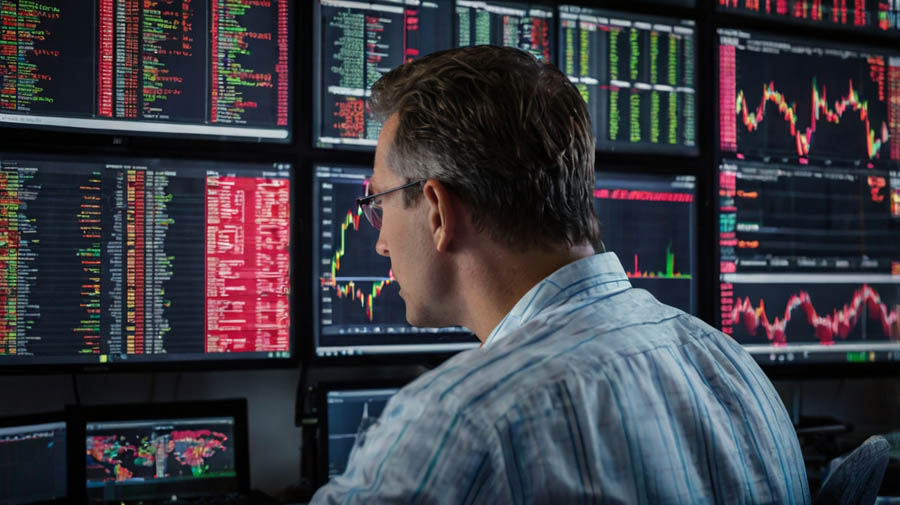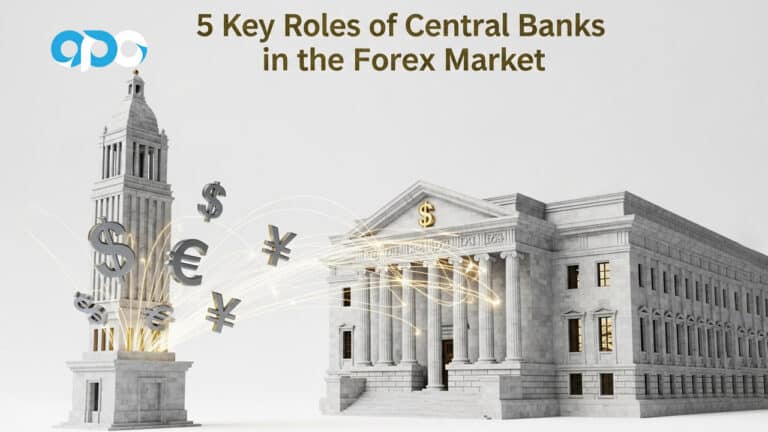The forex market presents vast opportunities for financial gain, attracting traders from various backgrounds. However, achieving consistent profitability goes beyond technical expertise—it hinges on mastering trading psychology. This article delves into the critical role of emotions and mental discipline in forex trading. We explore effective strategies for leveraging psychological factors to make informed decisions, navigate market fluctuations, and sustain long-term success. Additionally, partnering with a trusted forex trading broker can provide the tools and support needed to optimize trading performance and maintain a disciplined approach.

Mastering trading psychology is not just a supplementary skill but a cornerstone of profitable trading. Successful traders distinguish themselves by their ability to regulate emotions, stick to trading plans, and learn from setbacks. By the end of this article, you will gain valuable insights into forex trading psychology and actionable tips to strengthen your mental approach.
Understanding Trading Psychology in Forex
Trading psychology in forex encompasses the mental and emotional factors influencing traders’ decision-making processes. It includes managing emotions like fear, greed, discipline, confidence, and emotional control. Understanding these dynamics in the fast-paced forex market is crucial for success.

Forex trading involves high-pressure decisions. Rapid price changes, constant news updates, and the allure of profits can evoke strong emotions. Fear of missing out (FOMO) may lead to impulsive trades, while fear of losses can prompt premature exits, potentially missing out on gains.
Fear and Greed in Forex Trading
Fear and greed are the two most powerful emotions in trading psychology in forex. Fear can manifest in various forms: fear of losing money, fear of missing out on potential gains, or fear of making mistakes. This emotion can paralyze traders, causing them to hesitate and miss out on profitable opportunities or exit trades prematurely. Greed, on the other hand, can lead to overtrading and taking unnecessary risks. It can make traders hold onto winning positions for too long, hoping for more profits, only to see the market reverse and erase their gains.
The Importance of Discipline
Discipline is the backbone of successful forex trading psychology. It involves sticking to your trading plan, regardless of market conditions or emotional impulses. A disciplined trader follows their set rules for entry and exit, risk management, and position sizing. This consistency helps in avoiding impulsive decisions that can lead to significant losses. Developing discipline requires a clear understanding of your trading strategy, setting realistic goals, and maintaining a calm and composed demeanor, even in volatile markets.
Read More: The Mindset of a Successful Trader
Confidence and Emotional Control
Confidence in trading comes from experience, knowledge, and a well-tested trading strategy. However, overconfidence can be detrimental. It can lead to taking excessive risks and ignoring warning signs. Emotional control, therefore, is crucial. Traders need to manage their emotions and remain objective, especially during periods of high volatility. Techniques such as meditation, mindfulness, and regular breaks can help in maintaining emotional balance.
The Significance of Mastering Trading Psychology
Mastering trading psychology in forex isn’t about eliminating emotions but managing them effectively. Successful forex traders exhibit emotional stability and unwavering discipline.

Emotional Stability in Trading
The fast-paced and volatile forex market can intensify emotions. Price swings trigger anxiety, while inactivity breeds boredom and the urge to overtrade. Recognizing these triggers is crucial for mitigating their impact. Emotional stability means maintaining composure amid market turbulence and not getting carried away by winning streaks.
Developing a Resilient Mindset
Resilience is key in forex trading psychology. It involves quickly recovering from losses and setbacks. Successful traders learn from losses, foster a positive mindset, and control emotions through methods like trade journaling.
The Role of Discipline and Routine
Discipline and routine are vital. Establishing a daily trading routine fosters focus and consistency. This routine should include analysis, trade planning, and performance review. Discipline ensures adherence to the trading plan, reducing emotional decision-making. Regularly revising the plan prepares traders for market shifts.
Common Psychological Biases in Forex Trading
Behavioral finance, a subfield of economics, explores how psychological biases influence investment decisions. These biases can lead traders to make irrational choices, ultimately hindering their success. Here are some common biases to be aware of in forex trading:

Overconfidence Bias
Overconfidence bias occurs when traders overestimate their abilities and the accuracy of their predictions. This can lead to taking excessive risks and deviating from their trading plan. Overconfidence is often fueled by a series of winning trades, giving a false sense of control over the market. To combat this, traders should regularly review their performance, seek feedback, and remain humble, acknowledging that the market is unpredictable and that losses are part of the trading journey.
Anchoring Bias
Anchoring bias in forex trading involves overly relying on initial information, such as a price level or forecast, without adapting to new data. This can hinder decision-making and strategy adjustments. To avoid anchoring bias, traders should continuously seek and assess new information, remaining adaptable in their trading approach.
Read More: How to Overcome Fear in Forex Trading
Confirmation Bias
Confirmation bias leads traders to seek information that confirms their existing beliefs while disregarding contradictory evidence. This can reinforce incorrect assumptions and increase risk. To mitigate confirmation bias, traders should maintain objectivity by regularly challenging their viewpoints and considering alternative scenarios. Engaging with diverse sources helps in gaining a balanced perspective.
Loss Aversion Bias
Loss aversion bias causes traders to fear losses more than they value equivalent gains, often leading to holding losing positions too long. Implementing and sticking to strict stop-loss orders helps traders accept and manage small losses as part of a successful trading strategy.
Strategies to Enhance Your Forex Trading Psychology
Mastering the emotional aspects of forex trading requires a comprehensive approach. Here are key strategies to implement:

- Develop and Stick to a Trading Plan A well-defined trading plan is crucial for effective forex trading psychology. Outline clear entry and exit strategies, risk management parameters, and position sizing. Stick to your plan and adjust it based on objective analysis, not emotional reactions. Regularly review and refine your plan to adapt to market changes and enhance your experience.
- Continuous Education on Forex and Risk Management Stay informed about forex market dynamics, technical analysis, and fundamental factors. Equip yourself with robust risk management strategies to protect your capital. Continuous learning reduces uncertainty and helps manage emotions. Engage in webinars, read extensively, and participate in trading communities to stay updated and improve your skills.
- Effective Bankroll Management Manage your capital wisely by never risking more than you can afford to lose. Allocate a specific portion of your capital to forex trading and adhere to it strictly. Responsible use of leverage is crucial for mitigating risks. Well-managed bankroll ensures financial stability and reduces emotional attachment to trades.
- Utilize Stop-Loss and Take-Profit Orders Implement stop-loss and take-profit orders to automate trade exits. These tools help limit losses and secure profits objectively, without succumbing to emotional impulses. Set these orders based on your trading plan to maintain discipline and avoid emotional decision-making.
- Practice Emotional Control Develop self-awareness through techniques like trade journaling and meditation. Journaling tracks emotional responses and identifies patterns, while meditation enhances focus and reduces stress. Establish a pre-trade routine to prepare mentally and maintain emotional stability during trading.
- Limit Trading Activity Avoid overtrading by focusing on quality over quantity. Excessive trading can lead to emotional fatigue and poor decision-making. Set specific trading hours, take breaks, and concentrate on high-probability trades to maintain a clear mindset and avoid emotional pitfalls.
Additional Tips for Enhancing Your Trading Psychology
Enhancing your forex trading psychology involves continuous improvement and the adoption of various strategies to maintain emotional and mental balance. Beyond the foundational aspects of discipline, confidence, and emotional control, there are additional techniques and practices that can further bolster your trading mindset. Here are some additional tips for enhancing your forex trading psychology:
Find a Supportive Trading Community
Engaging with a supportive trading community can provide immense benefits. Being part of a community allows you to share experiences, seek advice, and learn from the successes and mistakes of others. Online forums, social media groups, and local trading clubs are great places to connect with like-minded individuals who understand the challenges of forex trading.
Benefits of a Trading Community
- Shared Knowledge: Access to diverse perspectives and strategies.
- Emotional Support: Encouragement and support during tough trading periods.
- Networking Opportunities: Connections that could lead to mentorship and collaboration.
Seek Professional Help if Needed
If you find yourself struggling with persistent emotional barriers that hinder your trading performance, consider seeking professional help. Psychologists or therapists specializing in trading psychology can provide valuable insights and techniques to help you manage stress, anxiety, and other emotional challenges.
Read More: How to Overcome Greed in Forex Trading
When to Seek Professional Help
- Persistent Anxiety: Ongoing anxiety that affects your decision-making.
- Emotional Outbursts: Difficulty controlling emotions during trading.
- Performance Decline: Noticeable decline in trading performance due to emotional issues.
Never Stop Learning and Evolving
The forex market is dynamic and constantly evolving. To stay ahead, you need to continuously educate yourself and adapt to new market conditions. Staying updated with the latest market trends, economic indicators, and trading strategies is crucial for maintaining a competitive edge.
Ways to Continue Learning
- Reading Books and Articles: Invest time in reading about trading strategies, market analysis, and trading psychology.
- Attending Webinars and Seminars: Participate in educational events to learn from experts.
- Online Courses: Enroll in online courses to deepen your knowledge and skills.
The Importance of Self-Care
Maintaining physical and mental well-being is crucial for optimal performance in forex trading. Trading can be mentally exhausting, and neglecting self-care can lead to burnout. Prioritize activities that promote health and well-being to ensure you remain sharp and focused.
Self-Care Practices
- Adequate Sleep: Ensure you get enough sleep to stay alert and make clear decisions.
- Healthy Diet: Eat a balanced diet to maintain energy levels and cognitive function.
- Regular Exercise: Physical activity reduces stress and improves mental clarity.
The Power of Visualization
Visualization techniques can be a powerful tool for cultivating confidence and achieving trading goals. By envisioning yourself making successful trades and managing emotions effectively, you can reinforce positive behaviors and outcomes.
How to Practice Visualization
- Daily Visualization Sessions: Spend a few minutes each day visualizing successful trades and emotional control.
- Positive Affirmations: Use affirmations to boost confidence and reinforce a positive mindset.
The Value of Journaling
Keeping a trading journal allows you to track your trades, analyze your performance, and identify emotional patterns. This self-reflection can help you refine your strategies and improve your decision-making process.
Benefits of Journaling
- Performance Analysis: Review and learn from past trades.
- Emotional Awareness: Identify emotional triggers and patterns.
- Strategy Refinement: Adjust and improve trading strategies based on insights.
The Importance of Seeking Feedback
Constructive feedback from experienced traders or mentors can provide valuable insights into your trading psychology and identify areas for improvement. Engaging with someone who has a different perspective can help you spot blind spots and refine your approach.
How to Seek Feedback
- Mentorship Programs: Join mentorship programs to receive guidance from experienced traders.
- Peer Review: Share your trading journal with peers and seek their input.
- Professional Coaching: Hire a trading coach for personalized feedback and support.
The Benefits of Demo Trading
Utilizing demo accounts to practice trading strategies and test your emotional responses in a risk-free environment can be incredibly beneficial. Demo trading allows you to hone your skills and build confidence without the pressure of real money on the line.
Advantages of Demo Trading
- Skill Development: Practice and refine trading strategies.
- Emotional Testing: Observe and manage emotional responses in a simulated environment.
- Risk-Free Learning: Gain experience without financial risk.
By incorporating these additional tips into your routine, you can enhance your forex trading psychology and develop a more resilient and effective trading mindset. These practices, combined with continuous learning and self-improvement, will help you navigate the complexities of the forex market with greater confidence and success.
Conclusion
The realm of forex trading is a complex interplay of market forces, technical analysis, and, most importantly, psychological factors. Mastering trading psychology empowers traders to make sound decisions, navigate emotional challenges, and achieve consistent profitability. By cultivating emotional discipline, implementing effective trading strategies, and continuously seeking knowledge, traders can transform the psychological aspects of trading from a hindrance to a driving force behind their success.
Remember, the path to forex trading mastery is a journey of self-discovery and emotional growth. Embrace the challenges, learn from your experiences, and refine your approach. With dedication and perseverance, you can harness the power of trading psychology to conquer the forex market and achieve your financial goals.
What are the most common psychological challenges faced by forex traders?
Forex traders often face a range of psychological challenges, including fear, greed, overconfidence, impatience, and loss aversion. These emotions can cloud judgment, lead to impulsive decisions, and hinder long-term trading success.
How can I develop a strong trading psychology?
Building a robust trading psychology requires a combination of self-awareness, discipline, and consistent effort. Here are some key steps:
Understand Your Emotions: Recognize how different emotions influence your trading decisions. Identify emotional triggers and develop strategies to manage them effectively.
Create a Trading Plan: A well-defined trading plan outlines your entry and exit criteria, risk management parameters, and position sizing. This helps you stay objective and avoid emotional trading decisions.
Practice Discipline: Discipline is essential for adhering to your trading plan and avoiding impulsive actions driven by emotions. Stick to your strategies, even when faced with setbacks or market volatility.
Manage Your Risk: Effective risk management is crucial for protecting your capital and limiting potential losses. Implement appropriate risk management measures based on your risk tolerance and trading style.
Seek Support: Engage with experienced traders, mentors, or online communities to gain valuable insights and support. Consider seeking professional help if you’re struggling with persistent emotional barriers.
How can I improve my emotional control in forex trading?
Improving emotional control in forex trading involves developing self-awareness and practicing techniques to manage stress and emotions. Here are some strategies:
Journaling: Keep a detailed trading journal to track your trades and emotional responses. Review it regularly to identify patterns and areas for improvement.
Meditation and Mindfulness: Practice meditation and mindfulness to enhance focus and reduce stress. These techniques can help you stay calm and composed during trading.
Visualization: Use visualization techniques to envision successful trades and positive outcomes. This can boost confidence and reduce anxiety.
Regular Breaks: Take regular breaks during trading to avoid emotional fatigue. Step away from the screen to clear your mind and regain focus.
What role does continuous education play in trading psychology?
Continuous education is vital for maintaining a strong trading psychology. It helps reduce uncertainty, build confidence, and improve decision-making. Staying informed about market trends, technical analysis, and risk management techniques enhances your ability to manage emotions and make informed decisions. Attend webinars, read books, follow market news, and engage with trading communities to continuously improve your skills.








One Response
Perfect piece of work you have done, this web site is really cool with good info .